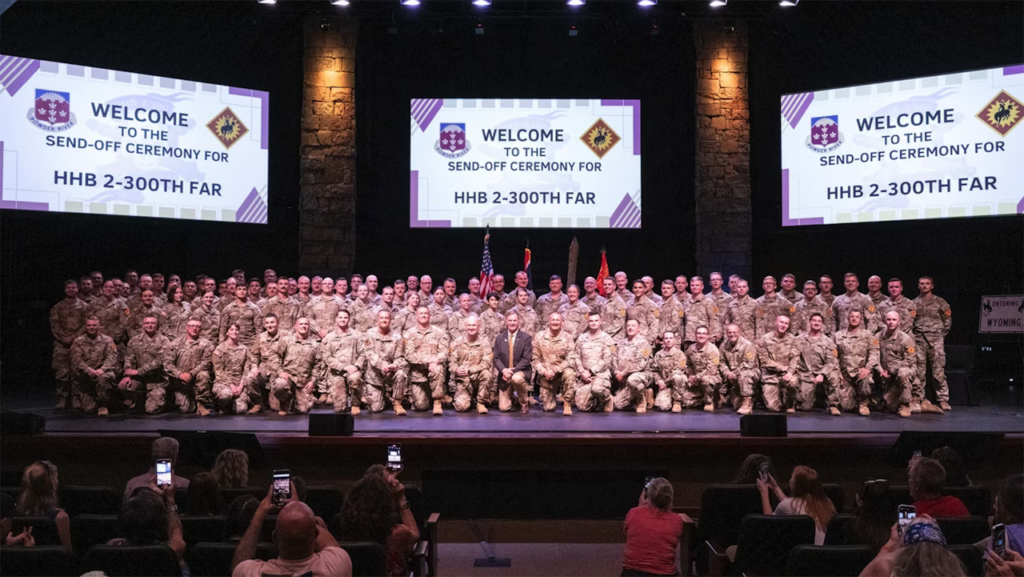A full HIMARS rocket artillery battalion has been deployed to the Middle East from Wyoming, first time in 70 years. That doesn’t sound good with all the warnings for World War III.
As missile strikes between Israel and Iran continue to make global headlines, more than 400 Wyoming National Guard soldiers and airmen continue their missions serving in the volatile region.
By Dale Killingbeck

As missile strikes between Israel and Iran continue to make global headlines, a few hundred Wyoming National Guard soldiers and airmen continue their missions serving in the volatile region.
Wyoming National Guard Strategic Communications Director Joseph Coslett Jr. said nearly 400 soldiers from the Wyoming Army National Guard were deployed to the Central Command in July.
And about 80 members of the Wyoming Air National Guard are helping on missions in five different commands including Central Command which governs the Middle East.
Coslett said he was unable to “share specifics due to operational security reasons.”
Wyoming U.S. Sen. John Barrasso said he is keeping close tabs on the troops and the happenings in the Middle East.
“I am certainly following the Wyoming Guard deployments I have two Guard attaches one in Washington, D.C., and one in Casper,” he said. “We work very closely with these groups.”
‘Cowboy Cannoneers’
In July, 360 members of Wyoming’s Army National Guard’s 2nd Battalion, 300th Field Artillery Regiment (2-300th) in Casper, Gillette, Lander and Torrington deployed to different Middle Eastern countries to support the ongoing Operation Spartan Shield and Inherent Resolve.
One known destination for some of the troops was Kuwait. Barrasso said he was not at liberty to disclose the various troop locations.
Barrasso said the “Cowboy Cannoneers,” or the 2-300th group deployed in July, are a regiment that goes back to the Teddy Roosevelt days.
“I’ve been with them in Afghanistan and Kuwait over the time I have been in the Senate. They make you proud, they make you well aware that we are in capable hands for the future,” he said.
Barrasso said his office has not heard from family members with specific concerns related to the latest headlines between Iran and Israel.
Various media, including the BBC are reporting that should Israel attack Iran, a possible response from that nation could involve U.S. facilities in the Persian Gulf region and not just Israel.
“In terms of what is going to happen in the future, you can speculate as well as anyone else and there is a lot being written about what Iran will do,” he said.

Full Battalion Overseas
At the time of deployment in July, the 2-300th’s commander Lt. Col. Michael Kingman said it was the first full field artillery battalion deployment in more than 70 years.
“Most of these deployments involved only portions of the battalion,” he was quoted in a July Wyoming National Guard article. “This mission marks the first time the battalion has deployed as an integrated whole on a field artillery mission since the Korean War.”
The battalion uses HIMARS or high mobility artillery rocket systems.
A Defense Department website lists the mission of Operation Spartan Shield, which launched in 2012, as one that “builds partner capacity in the Middle East to promote regional self-reliance and increase security.”
Operation Inherent Resolve was launched in 2014 as the U.S. military’s name for the international war on the Islamic State and terrorist networks, focused in Iraq and Syria. The U.S. Defense Department’s website quotes a Biden Administration source on Sept. 27 as stating Operation Inherent Resolve in Iraq will transition its military mission by September 2025 and in Syria by 2026 based on realities on the ground.
Coslett shared that Wyoming Air National Guard’s roles at its various command assignments include logistical support, civil engineers, communication, force protection, legal advisors, air traffic control and mortuary affairs.
As has been his practice, Barrasso said he plans to visit the deployed troops on Thanksgiving again this year.
“These are our neighbors, these are people in the national guard,” he said. “This is one of our larger deployments … they are in dangerous places and they are doing important work and they make all of us proud.”